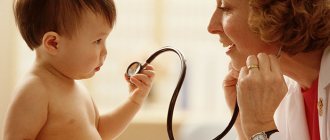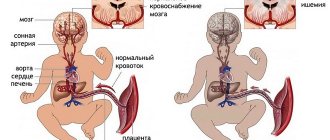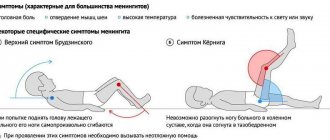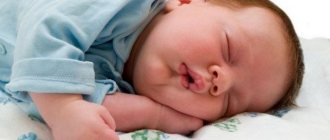Sometimes children in class have no time to study at all, and on the street they have no time to go for a walk. They may look wild, tense, dissatisfied, extremely slow, unable to put together two words in simple situations. Additional flavor to the painting entitled “Failure in Bloom” can be added by bitten nails, scratched hands and other signs of releasing accumulated tension. Sometimes even an intelligent parent, after a certain number of well-conducted conversations, loses his nerve and bursts out: “What kind of person are you? How can? All people are like people, and you...” But we want to warn you against unfair reproaches. The children are in a difficult situation! 50% of people suffer from neuroses at different periods of their lives, and often these neuroses debut in adolescence.
Causes and characteristics of teenage neuroses
A conflict situation in the family, frequent quarrels can cause neurotic disorders in a teenager.
The formation of neuroses in adolescents occurs in the presence of certain psychological and physiological factors (type of nervous system). In many children, neuroses arise in early childhood in the form of behavioral disorders (whims, aggression, hyperactivity, stubbornness, fears, etc.).
There are all the conditions for the emergence of neuroses in the modern era. The number of single-parent families has increased, and teenagers are experiencing stress from their parents’ divorce or living with a stepfather or stepmother. The workload of studies has increased significantly, which also aggravates the psycho-emotional stress, the excess of which not every teenager can tolerate.
Neurosis of adolescence (12-16 years old) is provoked and supported by a hormonal storm in the body: depression and mood swings are constant companions of this age.
Neuroses of adolescents are divided into general and systemic.
Common ones include:
- obsessive-compulsive neurosis;
- asthenic;
- anxiety neurosis;
- depressive;
- hysterical and other neuroses.
And the main systemic, or monosymptomatic, neuroses are considered to be neurotic stuttering, habitual actions, neurotic tics, etc.
Factors that provoke the development of psychoneurological disorders in children include:
- genetic: teenager’s personal characteristics and character traits (hysteria, emotional lability);
- cerebral-organic: minimal brain dysfunctions caused by the pathology of pregnancy and childbirth;
- psychosocial: tense relationships in the family, improper upbringing, stress, single-parent family, parental alcoholism, etc.
- incorrect education system: for ambitious reasons, parents often load their children with excessive extracurricular activities.
The relationship between parents and teenagers is of great importance. You must be attentive to the child, love him, but not “attach” him to yourself: he must have his own social circle, friends. There should always be time to listen to the child and, if necessary, support him.
Constant criticism and comparison with other children (not in favor of the child) will cause negativism and protest on the part of the teenager. This parenting tactic is doomed to fail. Each child has his own temperament and personality characteristics; the task of parents is to help him adapt to life’s demands.
How to prevent anxiety in teenagers
Adults play a major role in avoiding the development of anxiety as a stable personality trait. Parents should control their reactions and actions to various situations and circumstances in relation to their child (teenager).
- Do not instill in him ideas about the world only from the negative side, i.e. tell him only about obstacles and failures along the way, as well as the possibility of solving them.
- Be less demanding of the child’s activities. The constant struggle for results and the emphasis on achieving goals can increase the risk of anxiety due to the fear of not meeting adult expectations.
- Praise should not be only for successes, but should simply be present just because he is your child. Artificially induced feelings of fear will not help him achieve the desired results, but on the contrary will frighten him and slow him down on the path to achieving his goal.
Children hide their anxious feelings by attracting attention through hooliganism, noisy behavior, and antics. Such children seek understanding and approval, but achieve a different result with their behavior.
Teenage crisis
The psychological crisis in adolescence is the most acute. It’s not called the “negative phase of puberty” for nothing. It is characterized by a decrease in academic performance, disharmony of the individual’s inner world, a change of interests, and criticism. The teenager is actively engaged in self-analysis and knowledge of his own experiences. Many people start keeping a diary.
Negativism is also a symptom of the teenage crisis: hostility appears, a tendency to violate discipline and quarrels, and a desire for loneliness. Harmony between rights and responsibilities is very painful to form. Negativism is especially pronounced in young men.
They strive for permissiveness, calling it freedom. But a directive style in relationships with a teenager is unacceptable. You need to communicate patiently and agree on rules of behavior. A teenager needs to be understood and respected as an individual, and not humiliated and “read morals.”
Relationships with peers are more important for adolescents than with adults. The teenager becomes isolated from his family. Often teenagers form groups and companies with common interests, whose values differ from those of adults, and oppose them. This gives them a sense of independence.
Different values lead to inevitable disagreements with adults: about hairstyle, clothing style, school success, free time. And yet, the main values and aspects of social life, and attitudes towards them are inherited from parents. And momentary issues are resolved with peers.
Teenagers try to show their “adulthood” in romantic relationships with representatives of the opposite sex: sympathy, dating. In their fantasies they try to create a love ideal and write poetry. You need to show interest in your child’s likes without humiliation or excessive criticism.
Authoritarian control, prohibitions and manipulation of a child will lead to a paradoxical effect: either low self-esteem or a socially unacceptable form of behavior. But parental non-intervention and weakening of control are fraught with dangers when a teenager is left to his own devices, making decisions and choosing companies.
Adolescence is characterized by emotional outbursts and violent experiences; Almost every one of them has thoughts of suicide. Social phobias are predominant. Great importance is attached to assessing one's appearance and its shortcomings. Anxiety sometimes leads to self-isolation and fear of closed and open spaces.
Fear of ridicule, increased sensitivity, sudden mood swings are emotional disorders that are more typical for girls.
Types of teenage neuroses and their symptoms
The nature of the manifestations of neuroses in adolescents can be physiological and psychological.
Physiological symptoms:
- headaches and dizziness (due to spasms of cerebral vessels);
- sleep disorders (insomnia, nightmares, interrupted sleep);
- changes in appetite (up to neurotic anorexia or, conversely, bulimia);
- muscle weakness, increased fatigue;
- convulsions and nervous tics;
- neurotic cough;
- pain in the heart and stomach.
Psychological symptoms of neuroses:
- frequent mood swings, irritability;
- slight vulnerability, increased vulnerability, severe sensitivity;
- hysterical reactions;
- tendency to depression;
- various phobias (fears).
Depending on the clinical manifestations and combination of symptoms, the following types of neuroses are distinguished in adolescents:
- Hysterical neurosis, the manifestation of which is frequent hysterics with sobs. Hysterical paralysis of the limbs, loss of voice, vomiting, fainting, pseudoalgic manifestations (complaints of pain in the absence of organic damage) and others may be observed.
- Asthenic neurosis, the symptoms of which are general weakness, fatigue, sleep disturbances, manifestations of VSD in a teenager.
- Depressive neurosis with a desire for solitude, depressed mood. Often its development is associated with a stressful situation: parental divorce, death of a loved one, orphanhood and the role of “Cinderella”. Such neurosis can also occur if a teenager has a physical disability. Poor facial expressions, sad facial expressions, quiet speech, tearfulness, poor appetite and sleep, low self-esteem, low school performance - a portrait of a teenager with depressive neurosis.
- Obsessive-compulsive neurosis, manifested by tics, muscle spasms, and convulsions. In some adolescents, neurosis may manifest itself as an obsessive desire to utter indecent words. A neurotic compulsion can be dangerous (for example, a child may have a desire to jump from a balcony).
- Phobic neurosis, which is characterized by various fears (loneliness, death, darkness, etc.). Fear can occur in the form of an attack, especially before bedtime, accompanied by a feeling of anxiety, obsessive thoughts and ideas. It could also be a fear of giving an oral response in class or a fear of speaking in front of an audience.
- Hypochondriacal neurosis is manifested by excessive concerns and unreasonable fears of infection or the occurrence of various diseases.
Treatment or rehabilitation of teenage neuroses
Neuroses in adolescents are treated by:
- pediatric neurologist: examines the teenager to clarify the diagnosis, prescribes sedatives or other medications if necessary;
- child psychologist: helps teenagers cope with complexes, and parents find the right tactics and approach to the teenager, create the necessary psychological, friendly family climate;
- psychotherapist: for obsessive-compulsive neurosis, conducts hypnosis therapy sessions.
Psychiatrists, reflexologists, and endocrinologists may also be involved in treatment. Correctly and individually selected, timely comprehensive treatment makes it possible to completely rid a teenager of neurosis.
Prevention
The main role in ensuring psychological health and preventing the development of neurosis in adolescents belongs to parents.
It is important to follow these rules:
- Strict adherence to a daily routine will help normalize the functions of an unstable nervous system.
- It is necessary to monitor the child’s loads and reduce them if symptoms of overload appear.
- Strong physical activity will help reduce psychological stress.
- In case of psychological problems in the family, you should seek the help of a psychologist.
- In stressful situations, it is necessary to provide the child with consultation with a child psychologist.
- If a teenager experiences psychological stress, it is necessary to use relaxation remedies available at home (aroma lamp with soothing essential oils on the advice of a neurologist, pine baths, breathing exercises, taking decoctions of soothing herbs, etc.).
Neurological diseases in children
Most often, neurological diseases in children and newborns are the result of:
- — intrauterine fetal hypoxia;
- - exposure to teratogenic factors on the fetus during pregnancy (taking certain medications, drinking alcohol, smoking, HIV infection, syphilis, etc.);
- — birth injury (pinched nerve or damage to brain structures);
- - hereditary predisposition (presence of a disease gene in the genotype of one or both parents), genetic diseases;
- - past infection.
Characteristic symptoms of neurological diseases in children:
- - delayed physical and neuropsychic development;
- - absence or weakening of congenital reflexes;
- - visual or hearing impairment;
- - muscle wasting;
- — violation of the formation of voluntary movements.
Nerve diseases in children can appear at any age, but more often they are observed from birth.
Summary for parents
Teenage neuroses are easier to prevent than to get rid of them. Treatment of neurosis until complete recovery is possible with timely seeking help from specialists and patiently following all recommendations.
Prevention of teenage neuroses largely depends on proper upbringing and family relationships. It is important to teach children to overcome life’s difficulties, to mentally strengthen a child with an anxious and suspicious character, and to be interested in his problems and interests.
State TV and Radio Company “Crimea”, program “The ABC of Health”, issue on the topic “Neuroses in Adolescents”:
Symptoms of neurosis in adolescents
Signs of a neurosis-like state in adolescence:
- suspiciousness;
- fear, fear, uncertainty;
- irritation due to fatigue;
- sleep disturbance;
- pathological uncertainty, indecision;
- low self-esteem;
- tearfulness;
- excessive touchiness;
- decreased concentration.
At the same time, physical ailments arise:
- dizziness;
- abdominal pain;
- increased sweating;
- cardiopalmus;
- diarrhea or constipation;
- loss of appetite;
- stool disorder.
Teenagers with psychoneurological disorders often begin to think about death, afraid of dying in their sleep. They experience mood swings, moodiness, and tearfulness. Hysterics in high school students are caused by a situation that traumatizes their psyche. Such children often experience internal conflicts and are discriminated against as individuals.
Symptoms of neurosis are aggravated by the family environment. Often in a family there is no trusting relationship between parents and child; adults consider the teenager to be still small and are not interested in his problems. Often the situation is aggravated by quarrels and conflicts between parents, often against the background of alcoholism, which causes psychological trauma to the child.
Adolescent neurosis occurs in boys and girls in their final year before exams. The following symptoms of a mental disorder are often observed:
- depression;
- insomnia;
- panic;
- tearfulness;
- lack of appetite.











